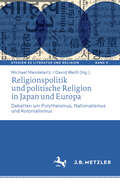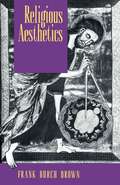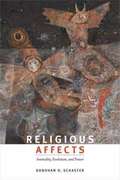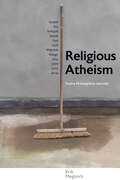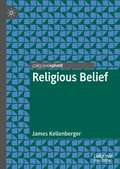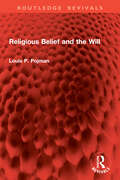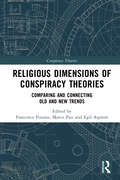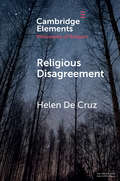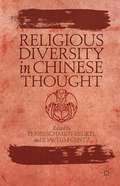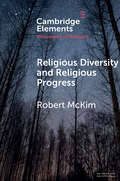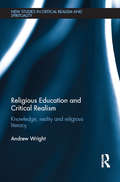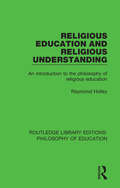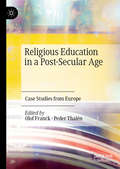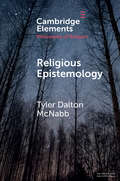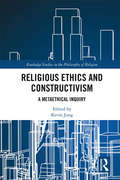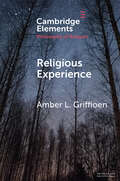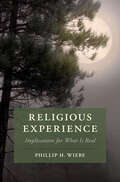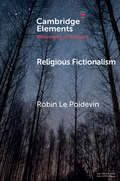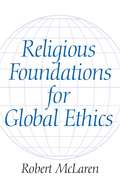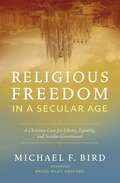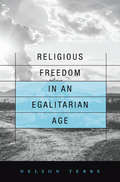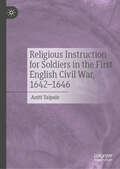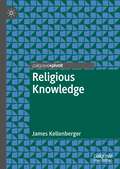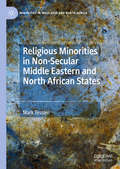- Table View
- List View
Religionspolitik und politische Religion in Japan und Europa: Debatten um Polytheismus, Nationalismus und Kolonialismus (Studien zu Literatur und Religion / Studies on Literature and Religion #8)
by David Weiß Michael MandelartzIn der neueren Debatte um das Wechselverhältnis von Religion und Politik hat Japan bislang keine Rolle gespielt; zu Unrecht, wie der vorliegende Band zeigt. Japan dürfte das einzige Land mit polytheistisch geprägter Kultur sein, das dem Imperialismus erfolgreich Widerstand entgegensetzte. Mit dem Aufstieg zur Kolonialmacht und der Erhebung des Shintoismus zur Staatsreligion stellte es die Denkmuster europäischer Überlegenheit infrage. Die polytheistische Religion sollte in diesem Transformationsprozess die historische Kontinuität des neuen Staates verbürgen. Dabei stimmen die rhetorischen Strategien überraschend genau mit dem Rückgriff der deutschen Romantik auf vermeintliche ‚Ursprünge‘ überein. Religiöse Symbolsprachen sind interpretationsoffen gegenüber politischen Deutungen, auch quer zur Unterscheidung von poly- und monotheistischen Religionen. Dies zeigt der Band in fünf Fallstudien von Germanisten und Japanologen.
Religious Aesthetics: A Theological Study of Making and Meaning
by Frank BrowningMany modes of religious expression and experience have a markedly aesthetic component, even though aesthetic delight itself often appears to be free of moral or religious interests. In this ground-breaking work, Frank Burch Brown shows how aesthetics, no less than ethics, can play a central role in the study of religion and in the practice of theology.
Religious Affects: Animality, Evolution, and Power
by Donovan O. SchaeferIn Religious Affects Donovan O. Schaefer challenges the notion that religion is inextricably linked to language and belief, proposing instead that it is primarily driven by affects. Drawing on affect theory, evolutionary biology, and poststructuralist theory, Schaefer builds on the recent materialist shift in religious studies to relocate religious practices in the affective realm--an insight that helps us better understand how religion is lived in conjunction with systems of power. To demonstrate religion's animality and how it works affectively, Schaefer turns to a series of case studies, including the documentary Jesus Camp and contemporary American Islamophobia. Placing affect theory in conversation with post-Darwinian evolutionary theory, Schaefer explores the extent to which nonhuman animals have the capacity to practice religion, linking human forms of religion and power through a new analysis of the chimpanzee waterfall dance as observed by Jane Goodall. In this compelling case for the use of affect theory in religious studies, Schaefer provides a new model for mapping relations between religion, politics, species, globalization, secularism, race, and ethics.
Religious Atheism: Twelve Philosophical Apostles (SUNY series in Theology and Continental Thought)
by Erik MeganckFeuerbach, Marx, Kierkegaard, Nietzsche, Freud, Russell, Wittgenstein, Heidegger, Sartre, Levinas, Lyotard, Derrida. Why were these twelve so-called atheist heavyweights unable to wipe God off the table once and for all? Perhaps they did not intend to. Perhaps their atheism was directed at something other than God and religion. In that case, suggests Erik Meganck, we should look for a more fertile philosophical meaning of atheism to distinguish it from the shallow, more popular definitions of the term. Toward this aim, Meganck offers a rereading of the twelve apostles in this book, who are, he demonstrates, more religious than public opinion often holds. God and religion do not disappear in their work, but each of them tears down a pillar from the grand edifice that is traditional metaphysics. Modern thought has gradually dismantled philosophical and theological systems—“theisms”—which means that we must look for God in the “a-” rather than in “theism.” Meganck's adventurous and daring exploration calls into question the traditional polarity of theism and atheism, leading philosophy and theology away from metaphysical theism, through the death of God, and into a philosophical atheism that does not speak out on the existence of God but hears the Name. This Name opens onto a promise of sense.
Religious Belief (Palgrave Frontiers in Philosophy of Religion)
by James KellenbergerThis book addresses the different forms that religious belief can take. Two primary forms are discussed: propositional or doctrinal belief, and belief in God. Religious belief in God, whose affective content is trust in God, it is seen, opens for believers a relationship to God defined by trust in God. The book addresses the issue of the relation between belief and faith, the issue of what Søren Kierkegaard called the subjectivity of faith, and the issue of the relation between religious belief and religious experience. After the introductory chapter the book continues with a chapter in which features and forms of belief allowed by the general concept of belief are presented. Several of these forms and features are related to the features of religious belief examined in succeeding chapters. The book's final chapter examines God-relationships in the Christian tradition that de-emphasize belief and are not defined by belief.
Religious Belief and the Will (Routledge Revivals)
by Louis P. PojmanCan we ever achieve belief by a direct act of will? If it will help us to be happier, should we make ourselves believe propositions which the evidence alone does not warrant? These are the sort of questions which Professor Pojman examines in Religious Belief and the Will (originally published in 1986). He deals with a constellation of problems related to believing and willing to believe; his main concern is with religious faith and belief, though his analysis is also of interest to epistemology and ethics.Pojman asks what is so important about believing propositions in the first place, and why religious creeds have made propositional belief a necessary condition for salvation. He considers whether one can be rational and still use the will to believe what the evidence alone does not warrant. He also discusses whether faith and belief are generically related or distinct attitudes.This is the first full-length treatise on religious belief that approaches the subject from the viewpoint of volitional activity (i.e., related to the will). It presents a rethinking of the way the will interacts with belief, a relationship often misconstrued in works of philosophy and theology. Pojman believes that the will is central to religious commitment, and that by understanding the relationship between the attitude of belief and the activity of willing, we are enabled to get fresh insight into the classical problem of religious belief and the will.
Religious Dimensions of Conspiracy Theories: Comparing and Connecting Old and New Trends (Conspiracy Theories)
by Francesco Piraino Marco Pasi Egil AspremReligious Dimensions of Conspiracy Theories contributes to the study of conspiracy culture by analysing the religious and esoteric dimensions of conspiracy theories. The book examines both historical and contemporary examples to explore transnational and transhistorical continuities between religious doctrines, eschatologies, and conspiracy theories. It draws on a broad range of disciplinary insights from historians, sociologists, anthropologists, and religious studies scholars. The book has a global focus and features case studies from North America, Europe, the Middle East, Asia, and Africa. This book will be of great interest to researchers of conspiracy theories, esotericism, extremism, and religion
Religious Disagreement (Elements in the Philosophy of Religion)
by Helen De CruzThis Element examines what we can learn from religious disagreement, focusing on disagreement with possible selves and former selves, the epistemic significance of religious agreement, the problem of disagreements between religious experts, and the significance of philosophy of religion. Helen De Cruz shows how religious beliefs of others constitute significant higher-order evidence. At the same time, she advises that we should not necessarily become agnostic about all religious matters, because our cognitive background colors the way we evaluate evidence. This allows us to maintain religious beliefs in many cases, while nevertheless taking the religious beliefs of others seriously.
Religious Diversity
by Roger TriggShould we merely celebrate diversity in the sphere of religion? What of the social cohesion of a country? There is a constant tug between belief in religious truth and the need for respect for other religions. Religious Diversity: Philosophical and Political Dimensions examines how far a firm faith can allow for toleration of difference and respect the need for religious freedom. It elucidates the philosophical credentials of different approaches to truth in religion, ranging from a dogmatic fundamentalism to a pluralism that shades into relativism. Must we resort to a secularism that treats all religion as a personal and private matter, with nothing to contribute to discussions about the common good? How should law approach the issue of religious freedom? Introducing the relevance of central discussions in modern philosophy of religion, the book goes on to examine the political implications of increasing religious diversity in a democracy.
Religious Diversity In Chinese Thought
by Perry Schmidt-Leukel Joachim GentzThis collection of essays by major scholars analyze the religious diversity in Chinese religion, bringing together topics from traditional and contemporary contexts and Chinese religions' encounters with Western religion.
Religious Diversity and Religious Progress (Elements in the Philosophy of Religion)
by Robert McKimWhat is someone who has a perspective on religious matters to say about those who endorse other perspectives? What should they say about other religions? For example, might some of their beliefs be true? What stage are we human beings at in our religious development? Are we close to maturity, religiously speaking, so that most of the important religious ideas and innovations there will ever be have already appeared? Or are we starting out in our religious evolution, so that religious developments to date are merely the first rude efforts of a species in its religious infancy?
Religious Education and Critical Realism: Knowledge, Reality and Religious Literacy (New Studies in Critical Realism and Spirituality (Routledge Critical Realism))
by Andrew WrightReligious Education and Critical Realism: Knowledge, Reality and Religious Literacy seeks to bring the enterprise of religious education in schools, colleges and universities into conversation with the philosophy of Critical Realism. This book addresses the problem, not of the substance of our primal beliefs about the ultimate nature of reality and our place in the ultimate order-of-things, but of the process through which we might attend to questions of substance in more attentive, reasonable, responsible and intelligent ways. This book unpacks the impact of modern and post-modern thought on key topics whilst also generating a new critically realistic vision. Offering an account of the relationship between Religious Education and Critical Realism, this book is essential reading for students, scholars and practitioners interested in philosophy, theology and education.
Religious Education and Religious Understanding: An Introduction to the Philosophy of Religious Education (Routledge Library Editions: Philosophy of Education #10)
by Raymond HolleyThis book, first published in 1978, introduces readers to the topic of the philosophy of religious education in a way which demands little philosophical expertise on their part. It puts forward a particular theory of religious education in such a way that most of the major questions are faced and sufficient answers given to enable readers to examine the theory critically, and so further the development of philosophy and education.
Religious Education in a Post-Secular Age: Case Studies from Europe
by Olof Franck Peder ThalénThis book analyzes the changes and shifts in religious education in Europe over the past 50 years. In a post-secular age, it has become increasingly difficult to make sharp distinctions between what is religious and non-religious, confessional and non-confessional. Reforms in religious education in Sweden in the 1960s appeared as part of a process of wider secular liberalization, giving more credence to the idea of absolute neutrality in religious education. However drastic shifts in society, culture and the European religious landscape raise the need for a reevaluation of the foundations of religious education. Drawing on a range of case studies from across Europe, this book will appeal to students and scholars of religious education as well as post-secular education more generally.
Religious Epistemology (Elements in the Philosophy of Religion)
by Tyler Dalton McNabbIf epistemology is roughly the study of knowledge, justification, warrant, and rationality, then religious epistemology is the study of how these epistemic concepts relate to religious belief and practice. This Element, while surveying various religious epistemologies, argues specifically for Plantingian religious epistemology. It makes the case for proper functionalism and Plantinga's AC models, while it also responds to debunking arguments informed by cognitive science of religion. It serves as a bridge between religious epistemology and natural theology.
Religious Ethics and Constructivism: A Metaethical Inquiry (Routledge Studies in the Philosophy of Religion)
by Kevin JungIn metaethics, there is a divide between those who believe that there exist moral facts independently of human interests and attitudes (i.e., moral realists) and those who don’t (i.e., antirealists). In the last half century, the field of religious ethics has been inundated with various antirealist schools of moral thought. Though there is a wide spectrum of different positons within antirealism, a majority of antirealist religious ethicists tend to see moral belief as an historically dependent social construction. This has created an environment where doing religious ethics in any metaphysically substantial sense is often seen not only as out of fashion but also as philosophically implausible. However, there is a lack of clarity as to what antirealists exactly mean by "construction" and what arguments they would use to support their views. Religious Ethics and Constructivism brings together a diverse group of scholars who represent different philosophical and theological outlooks to discuss the merits of constructivism vis-à-vis religious ethics. The essays explore four different kinds of constructivism in metaethics: social (or Hegelian) constructivism, Kantian constructivism, Humean constructivism, and theological constructivism. The overall aim of these essays is to foster dialogue between religious ethicists and moral philosophers, and to open the field religious ethics to the insights that can be provided by contemporary metaethics.
Religious Experience (Elements in the Philosophy of Religion)
by Amber L. GriffioenThis Element looks at religious experience and the role it has played in philosophy of religion. It critically explores the history of the intertwined discourses on mysticism and religious experience, before turning to a few specific discussions within contemporary philosophy of religion. One debate concerns the question of perennialism vs. constructivism and whether there is a 'common core' to all religious or mystical experience independent of interpretation or socio-historical background. Another central discussion concerns the epistemology of purportedly theophanic experience and whether a perceptual model of religious experience can provide evidence or justification for theistic belief. The Element concludes with a discussion of how philosophy of religion can productively widen its treatment of religious experience in the service of creating a more inclusive and welcoming discipline.
Religious Experience: Implications for What Is Real (Cambridge Studies in Religion, Philosophy, and Society)
by Phillip H. WiebeIn this book, Phillip Wiebe examines religious, spiritual, and mystical experiences, assessing how these experiences appear to implicate a spiritual order. Despite the current prevalence of naturalism and atheism, he argues that experiences purporting to have a religious or spiritual significance deserve close empirical investigation. Wiebe surveys the broad scope of religious experience and considers different types of evidence that might give rise to a belief in phenomena such as spirits, paranormal events, God, and an afterlife. He demonstrates that there are different explanations and interpretations of religious experiences, both because they are typically personal accounts, and they suggest a reality that is often unobservable. Wiebe also addresses how to evaluate evidence for theories that postulate unobservables in general, and a Theory of Spirits in particular. Calling for more rigorous investigation of these phenomena, Wiebe frames the study of religious experience among other accepted social sciences that seek to understand religion.
Religious Fictionalism (Elements in the Philosophy of Religion)
by Robin Le PoidevinThis Element is an introduction to contemporary religious fictionalism, its motivation and challenges. Among the issues raised are: can religion be viewed as a game of make-believe? In what ways does religious fictionalism parallel positions often labelled 'fictionalist' in ethics and metaphysics? Does religious fictionalism represent an advance over its rivals? Can fictionalism provide an adequate understanding of the characteristic features of the religious life, such as worship, prayer, moral commitment? Does fictionalism face its own version of the problem of evil? Is realism about theistic (God-centred) language less religiously serious than fictionalism?
Religious Foundations for Global Ethics
by Robert MclarenReligious Foundations for Global Ethics is an overview of morality in a "nation of immigrants," starting with the basic question of what morality is, and culminating in an examination of morality as a source of potential conflict, and how those conflicts can be resolved peacefully. The author strives to discuss ethical concerns from a variety of religious, philosophical and psychological perspectives, so that students are able to conside issues outside of their own cultural point of view.
Religious Freedom in a Secular Age: A Christian Case for Liberty, Equality, and Secular Government
by Michael F. BirdDiscover how to responsibly defend religious freedom for all without compromising your personal beliefs.Religious freedom is a bitterly contested issue that spills over into political, public, and online spheres. It's an issue that's becoming ever more heated, and neither of the global political polarities is interested in protecting it. While the political left is openly hostile toward traditional religion, the political right seeks to weaponize it.How can we ensure that "religious freedom" is truly about freedom of one's religion rather than serving an ethno-nationalist agenda?In Religious Freedom in a Secular Age, Michael Bird (New Testament scholar and author of Evangelical Theology) has four main goals:To explain the true nature of secularism and help us to see it as one of the best ways of promoting liberty and mutual respect in a multifaith world.To dismantle the arguments for limiting religious freedom.To outline a biblical strategy for maintaining a Christian witness in a post-Christian society.To encourage Christians to participate in a new age of apologetics by being prepared to defend not only their own believes but also the freedom of all faiths.While Bird does address the recent political administrations in the US, his focus is global. Bird—who lives in Melbourne, Australia—freely admits to his anxiety of the militant secularism surrounding him, but he also strongly critiques the marriage of national and religious identities that has gained ground in countries like Hungary and Poland.The fact is that religion has a lot to contribute to the common good. Religious Freedom in a Secular Age will challenge readers of all backgrounds and beliefs not only to make room for peaceable difference, but also to find common ground on the values of justice, mercy, and equality.
Religious Freedom in an Egalitarian Age
by Nelson TebbeNelson Tebbe shows how a method called social coherence offers a way to resolve conflicts between advocates of religious freedom and proponents of equality law. Based on the way people reason through moral problems in everyday life, it can lead to workable solutions in a wide range of issues, including gay rights and women’s reproductive choice.
Religious Instruction for Soldiers in the First English Civil War, 1642–1646
by Antti TaipaleThis monograph examines religion in the first English Civil War as a tool for war both in instructing soldiers and portraying the enemy. It argues that thus far, the remarkable differences between the teaching of Parliamentarian and Royalist ministers to their respective armies have gone largely unnoticed. Relying on the methodologies of intellectual history combined with a comparative approach, it offers a new interpretation of soldiers&’ religious radicalism and highlights differences between the armies&’ spiritual edification. Hence, it contributes significantly to the history of the Wars of the Three Kingdoms and to the study of political radicalisation leading up to the regicide of Charles I. Moreover, it offers a detailed study of the ways in which religion was used as a tool for war in the early modern period. The role of religion has often been at the centre of historiography of the Wars of the Three Kingdoms (1639-1653). This prominence has culminated in the stereotypical character of a godly Puritan soldier, especially in relation to the New Model Army. However, while there have been debates about the role and importance of religion for the conduct and success of the armies, the theme of soldiers&’ religious instruction as a tool of advice and indoctrination has received less attention. The main aim of this book is thus to rectify this lack in the historiographical mainstream and to set out a new significant interpretation of the religious character of the Civil War.
Religious Knowledge (Palgrave Frontiers in Philosophy of Religion)
by James KellenbergerThis book addresses the place of religious knowledge in religion, particularly within Christianity. The book begins by examining the difference between the general concepts of knowledge and belief, the relation between faith and knowledge, and reasons why belief as faith, and not knowledge, is central to the Abrahamic religions.The book explores the ambivalence about religious knowledge within Christianity. Some religious thinkers explicitly accepted and sought religious knowledge, as did St. Thomas Aquinas, while others, notably Søren Kierkegaard, cast knowledge and seeking it as incompatible with faith. The book also examines two antithetical religious intuitions about knowledge, both at home in the Christian tradition. For one, faith requires a struggle with doubt. For the other, faith requires a certainty that excludes doubt. For the first, religious knowledge would destroy faith. For the second, religious knowledge is compatible with faith and completes it.Though the book focuses on the Christian tradition, it also considers other traditions, including a chapter on the place of religious knowledge in nontheistic religious traditions. The final chapter examines how coming to Wisdom as personified in the Jewish and Christian traditions may be distinct from attaining religious knowledge.
Religious Minorities in Non-Secular Middle Eastern and North African States (Minorities in West Asia and North Africa)
by Mark TesslerThis book describes and compares the circumstances and lived experiences of religious minorities in Tunisia, Morocco, and Israel in the 1970s, countries where the identity and mission of the state are strongly and explicitly tied to the religion of the majority. The politics and identity of Jews in Tunisia and Morocco and Arabs in Israel are, therefore, shaped to a substantial degree by their status as religious minorities in non-secular states. This collection, based on in-depth fieldwork carried out during an important moment in the history of each community, and of the region, considers the nature and implications of each group’s response to its circumstances. It focuses on both the community and individual levels of analysis and draws, in part, on original public opinion surveys. It also compares the three communities in order to offer generalizable insights about ways the identity, political culture, and institutional character of a minority group are shaped by the broader political environment in which it resides. The project will appeal to scholars and students in the fields of Middle Eastern and North African studies, Judaic studies, Islamic Studies, minority group politics, and international relations and the Arab-Israeli conflict.
